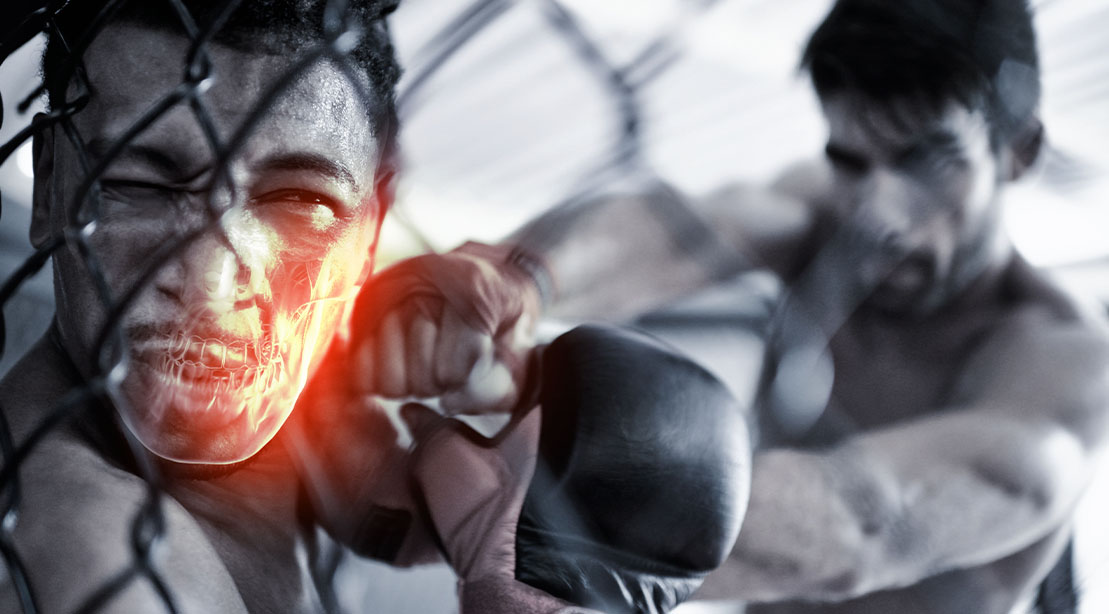28-Days-to-Lean Meal Plan
With the right plan and the right discipline, you can get seriously shredded in just 28 days.
Read article
Mixed martial arts is inherently an endeavor of great physical risk. As a full contact sport, match cards often change with short notice as combatants are forced to miss bouts due to injury. Then there’s the age factor, as many observers feel that being over 35 and entering the cage is a fools errand. Fortunately, whether you compete or not, MMA training is a great way to get fit, and is enjoyed by people of all abilities and backgrounds.
So, whether you have big dreams of entering the Octagon, or just want to mix it up in an MMA style, Todd McGrath MD, a sports medicine physician at the Hospital for Special Surgery, and an orthopedic consultant for UFC answers our questions. Fortunately, you don’t need to take a pile of supplements or call it a day at 35, just so long as you follow some basic principles.
Dr McGrath knows all about the importance of recovery and not pushing through injuries, since he has competed on the national and international level as a triathlete. He was a multiple-time USA Triathlon All-American, competed at the Ironman Triathlon World Championships, and completed 8 Ironman length triathlons. He has also represented the United States at the ITU Long Course Triathlon World Championships.

What are the most common injuries associated with mixed martial arts fighting?
Todd McGrath, MD: Head injuries followed by hand/wrist. Lacerations, concussions and fractures.
Leg breaks are a very serious injury that many fighters face. Once a leg is broken, can it ever be as strong again?
Yes, depending on the fracture and treatment many fractures can heal and have no long term or residual issues.
Statistically, very few fighters are able to successfully defend a title in UFC above the age of 35. What factors do you think might be at play here?
We know there is a normal age-related decline in athletic performance. We see this in many sports. In addition, the sum of years of training and fighting at a high level may also play a role in the decline in performance.
Are there any changes in physical training that athletes over 35 should consider and why?
It is important to take the time to recover appropriately, which may take a little longer as we age. As such, allowing more time to recover from harder training sessions is important.
Are there any vitamins or health supplements that athletes over 35 should consider and why?
In general, there are not many supplements that I routinely recommend for athletes unless there are specific reasons for doing so. This includes things such as Vitamin D if there is a documented low level. The other supplement to consider is creatine supplementation which has been shown to have some benefit for traumatic brain injury. These recommendations hold true for all ages, however.
Does declining testosterone levels, as we get older, mean we may be more likely to suffer injuries or take longer to recover?
We know that testosterone does decline as we age, but the rate of that is variable. At this point, however, there is not enough evidence in support of or against the use of it in the treatment of orthopedic injuries. Keep in mind that testosterone is banned both in and out of competition for most sports. Given this and the lack of supportive evidence I would not consider supplementation of testosterone for injuries to counter any normal age-related decline in testosterone.
Is there an age where you would recommend against full contact MMA competition? If so / if not, why?
Regardless of age, MMA is a contact sport with a high rate of injuries. Athletes should have a good understanding of this and take appropriate measures to mitigate risk as much as possible. It is important to recover appropriately and fully before returning to full contact. As athletes experience an age-related decline in fitness/strength/endurance, it may be harder to maintain the high level of fitness needed to fight or recover well enough to continue fighting and this can be an indication to step away from full contact due to increasing risk of injury.
This does not mean that the athletes should not continue training. The training involved in MMA certainly leads to a high level of fitness and probably helps to slow age-related declines in fitness.
What are good recovery methods for MMA fighters and why?
Similar to most sports, allowing appropriate time to recover, avoiding overtraining, eating a well-balanced diet and getting plenty of sleep/rest are probably the most important. In addition, treating small injuries and not attempting to ‘push through’ or ignore injuries is important.
Get some rest, dear readers, and we’ll see you back on the mat!